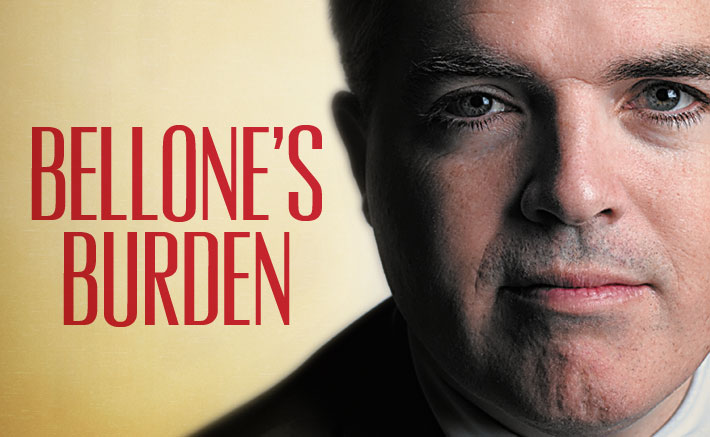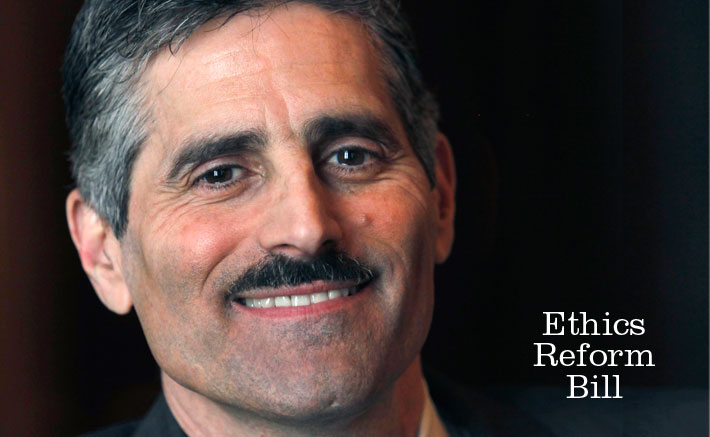

“It’s still a mess. We’re still dealing with a huge crisis here.” —Suffolk County Executive-Elect Steve Bellone (Jim Lennon Photographer/Long Island Press www.jimlennon.com)
Balancing the Books
To bolster the police department, the legislature approved a 2-percent tax increase for the police district that covers Suffolk’s five western towns, amounting to about $27 more annually per household. To offset Levy’s massive layoffs, the legislature dipped into the county’s “rainy day” reserves, voting to take more than $10 million from the tax stabilization fund and leave some $50 million behind.
Levy said “these two irresponsible measures”—the six-month budget and the early withdrawal—caused Moody’s Investor Service recently to downgrade Suffolk’s $400 million in short-term borrowing, possibly adding another $1 million in interest costs. The credit-rating firm said it will decide within 90 days whether Suffolk’s long-term debt should also be downgraded due to its concerns about the county’s “structurally imbalanced budget” and “its narrowed cash position, with the potential for further financial weakness without the implementation of proposed midyear expenditure reductions.” Moody’s move went further than the negative ratings from Fitch Rating Service last month and Standard & Poors in May.
“It is important to note that under the Levy administration there were seven bond upgradings that brought us to the highest level in county history,” said a Levy spokesman in a statement to the Long Island Press. “The bond-raters were especially positive about having an executive who was willing to make tough decisions and impose recurring savings.”
The legislature and the incoming county executive beg to differ with that explanation, and the comptroller concurs.
“I totally agree with them,” Sawicki says. “The budget that Levy gave them for 2012 was so irresponsible, with so many phantom revenues, that they had more than they could handle in trying to put some kind of budget together.”
“Levy screwed this county by not raising taxes when he needed to, because that was his platform,” says Montano. “[But] at least Levy could read the budget. He was a good numbers man; he was a lousy people person. He arranged the budget so the collapse would come in 2013 when he figured he would be out of here by 2015 but he got caught, so Bellone is going to be sitting there when the collapse comes.”
This week the county borrowed $300 million on Tuesday and $100 million on Wednesday in short-term loans to be paid back with next year’s property taxes. After the county closes its multi-million dollar deficit in 2012, it can begin the much harder task of balancing the budget in 2013, when the projected gap might reach $350 million.
Suffolk Democratic Chairman Rich Schaffer says that “the magnitude of the problem” did not “just happen overnight,” and he blames his former political ally, Steve Levy.
“We’re now learning that he has been spinning for the last eight years as much as Bernie Madoff [has],” Schaffer says, “because he has consistently not told the truth about the county’s finances.”
The party boss believes the six-month budget for 2012 will give Bellone “leverage over the unions to come up with reasonable concessions to help the county financially.” In the campaign, Cheryl Felice, president of the Suffolk County Association of Municipal Employees, endorsed Carpenter, but she’s publicly pledged to work with Bellone.
“I think a lot of the good ideas our membership presented in the past to County Executive Levy were not looked upon favorably,” Felice says, “and I’m hoping for a better dialogue of open communication with County Executive Bellone.”
Bellone has already made it clear that Richard Dormer, the current police commissioner, can’t leave his position fast enough. Bellone has named Edward Webber, the chief of support services, to replace Dormer in the interim as he launches a nationwide search for someone who is “data driven” in making policing decisions, who values “doing community policing the right way,” and “who is prepared to hold commanders accountable for their performance” in deploying resources where crimes are being committed. Bellone has also named James Burke, the chief investigator for the district attorney, to be the department’s top uniformed officer.
“The public is starting to see what’s really been going on behind the scenes for a long time,” says Bellone. “Unfortunately law enforcement in this county is severely divided. It is not working together… You have the sheriff’s department and the police department at war.”
Noting that in recent interviews about the Gilgo Beach murder investigation Spota has been critical of Dormer, Bellone says, “You now clearly know that the district attorney’s office does not believe that the police department has been operating effectively, and we’re seeing that play out in the highest-profile case that the department has had to deal with in decades. On top of that, you have a police department that’s under monitoring essentially by the Justice Department [for its handling of hate crimes against Latinos]. … The evidence has clearly begun to mount that law enforcement in this county is right now demoralized and dysfunctional, and that’s the responsibility of the county executive.”
In a statement to the Press, Levy defended his police commissioner.
“I ran, and was elected, on a platform that specifically included giving control of the police department back to management, rather than the police union, and implementing reforms such as civilianization, redeploying highway patrol officers and creating more efficient shifts,” he writes. “Rich Dormer implemented these changes, and the result is that we have controlled the growth of police costs for taxpayers dramatically while lowering total crime by more than 20 percent.”
But it’s going to be hard to erase Dormer’s handling of the Gilgo serial killer case from the public’s memory. Schaffer called the outgoing commissioner “a laughingstock” and “an embarrassment.” Says Schaffer: “He is talking about this investigation as if he’s Kreskin and he knows all!”
But more seriously, Schafffer believes that questions have rightly been raised about Suffolk crime statistics because, under the current administration, there was a “rush to make sure that everything was perfect in Levy-land… You wouldn’t want the public to think there was crime in the county!”
Public safety promises to be a front-burner issue for the new county executive and the legislature in 2012.






